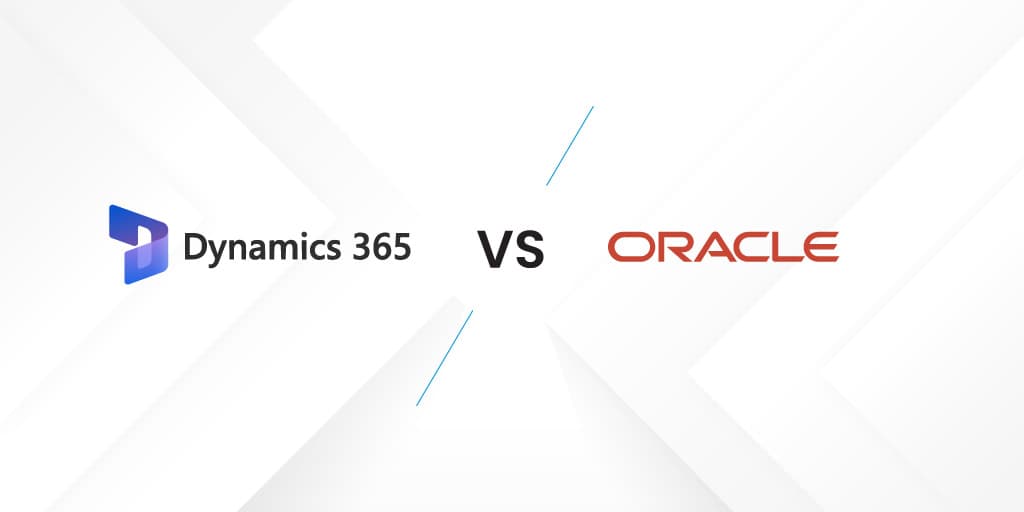
Engineering a Crisis-proof Financial Strategy for the Next Decade with Dynamics 365 Finance
Introduction: Financial strategy in an era of persistent uncertainty Economic volatility has become a recurring feature of modern business. ...

Are you ready to take your small business to the next level and grow into a midsize business? If so, you’ve likely realized that relying on outdated, manual systems will no longer meet your needs. Your customers expect exceptional service, and you do not want to disappoint them. That’s where a CRM solution makes a difference. However, with so many options, it is easy to feel lost in the research and comparison phase. We get it – running a business is a challenge! To help make your decision easier, we have outlined the features of two of the best leading CRM solutions, Dynamics 365 and Oracle, so that you can choose the perfect one for your business needs.
This cloud-based tool comprises a suite of applications that can enhance yead tracking, field service automation, sales, marketing, and mobile device utilization. It also seamlessly integrates with various Windows applications, such as Outlook, SharePoint, and OneNote, saving you time and money. Beyond standard office tools, exploring Microsoft Dynamics 365 CRM integration options and benefits can reveal how to connect your entire tech stack for a truly unified data experience.
One of the best things about Dynamics 365 is Office 365’s mobile app, which has been greatly improved to provide users with a personalized workspace and a list of upcoming tasks. The user-friendly dashboard also offers a modern display, and users can integrate their devices with the app for added convenience. Additionally, with its connected Field Service features, organizations can shift to a more proactive and predictive service model using monitoring, predictive maintenance, machine learning, and IoT.
Whether you need the complete suite or just a few of its features, Dynamics 365 is a versatile CRM solution that can meet your business needs.
Oracle is a recognized leader in the CRM market, offering businesses of all sizes a user-friendly platform to manage customer relationships, enhance sales productivity, and optimize the sales process. The Oracle CRM tool is designed to allow businesses to oversee and regulate their customer relationships, from lead qualification and categorization to opportunity tracking and management.
What sets Oracle apart is its impressive range of integrated marketing campaign management tools, lead nurturing features, and ROI measurement tools, all aimed at empowering businesses to drive sales growth. Notably, Oracle eliminates the need for complex installation procedures or the purchase of additional software. The platform identifies changes in the user’s environment. It uses a comprehensive set of APIs to retrieve business logic and service-related data, ensuring seamless synchronization for easy access and modification.
Oracle understands the importance of data security and provides a single sign-in feature that highly benefits businesses. You can be assured that your data is safeguarded; the platform is committed to maintaining the integrity of your data’s security. With Oracle, managing customer relationships has never been simpler or more worry-free.
Dynamics 365’s pricing plan depends on your required features and services. Prices vary from basic to comprehensive plans with AI-driven customer insights. To find the best plan for your budget and needs, assess your business requirements and compare them with available options. Dynamics 365 has flexible pricing plans for businesses of all sizes and budgets.
Know more: https://dynamics.microsoft.com/en-us/pricing/
Similar to Dynamics 365, the pricing of Oracle CRM depends on your business needs. For more information, check out Oracle’s site: https://www.oracle.com/corporate/pricing/
Both Microsoft Dynamics 365’s suite of CRM applications (formerly known as Dynamics CRM) and Oracle’s Cloud modules provide the fundamental features you would anticipate from a top-notch CRM solution. You would be equipped with essential functions to manage customer data, build relationships, track sales, provide top-notch customer service, and engage with customers through social media platforms.
But why commit to the entire CRM pie when you can pick and choose only the slices that suit your business needs? Both vendors offer a modular system of apps, allowing users to select only the functionality they require for their unique business requirements.
Of course, with great flexibility comes some confusion. It can be challenging to navigate many app options and determine which ones do what. So, let’s take a closer look at the individual modules offered by Microsoft Dynamics 365 and Oracle’s CX Cloud modules and their impressive functionality.
Dynamics 365 services are divided into apps, which can be used either as standalone or as part of a more extensive suite. In addition, the shared data model across Dynamics 365, Office, and Outlook allows easy data sharing and synchronization across products.
Dynamics 365 CRM comes with features that include:
This versatility is exactly why an engineering design company chose to implement Dynamics 365 CRM to handle their complex project lifecycles and customer interactions more effectively.
| Module | Features include: |
| Dynamics 365 for Sales | Customer data management
Opportunity and funnel management Partner Relationship Management Task management Sales performance management Contract management Quote and order management Marketing automation Customer service Knowledgebase management Reporting and analytics |
| Dynamics 365 for Customer Service | Cross-channel customer case management
Self-service portals Knowledgebase management Service Intelligence Incident routing |
| Dynamics 365 for Customer Insights | Customer journey management
Landing pages Email marketing Multi-channel campaign management Event planning and management, including event portals Lead management Webinars Marketing analysis with Power BI |
| Microsoft Social Engagement | Social media management
Social listening Social Selling Assistant Social analysis and insight |
Oracle’s platform is structured into separate “clouds,” each offering a distinct set of functions. These include engagement capabilities such as a unified sales cloud and service cloud module, sales tools such as sales force automation, sales performance management, and partner relationship management, and service tools like customer service, knowledge management, and policy automation.
Social media tools are also included, including social media management, social listening, and customer engagement. These include loyalty tools for program deployment, member management, and customer acquisition and engagement. Marketing automation, cross-channel orchestration, and social marketing features are also included.
Oracle also offers CPQ (Configure, Price, Quote) features for product configuration, pricing, and discounting. Users can also purchase standalone apps, such as the Sales Performance Management Cloud and the Customer Data Management Cloud.
| Module | Features |
| Sales Cloud | Sales force automation
Sales performance management Partner relationship management Customer data management Reporting and analytics |
| Service Cloud | Customer service
Cross-channel case management Knowledge management Policy automation |
| Engagement Cloud | Unified Sales Cloud and Service Cloud module |
| Marketing Cloud | Marketing automation
Cross-channel orchestration Data management Content marketing Social marketing Testing and optimization |
| Loyalty Cloud | Customer acquisition and engagement
Loyalty program deployment Member management |
| Social Cloud | Social media management
Social listening Customer engagement Social Analytics |
| CPQ (Configure, Price, Quote) | Product Configuration
Pricing and discounting Proposal management Order execution |
To determine the most suitable option for your organization between Microsoft Dynamics and Oracle, it is essential to consider your specific needs and preferences. A reliable CRM implementation partner can assist you by creating a customized proposal that caters to your business’s requirements. This obligation-free proposal better explains how their product can help you achieve your company’s objectives.
As an experienced Microsoft Dynamics 365 CRM implementation partner, LevelShift specializes in on-demand services available whenever you need them. you only pay for the time used. Additionally, our one-on-one briefings ensure that you maximize your investment by learning to utilize all available features and tools effectively.
So why wait? Contact us today to embark on your journey to better CRM and business results.

Engineering a Crisis-proof Financial Strategy for the Next Decade with Dynamics 365 Finance
Introduction: Financial strategy in an era of persistent uncertainty Economic volatility has become a recurring feature of modern business. ...

The Rise of Autonomous AI Agents in Dynamics 365 Business Central
Work routines in most organizations include several administrative actions that do not require judgment but still occupy time. These repeate...

ERP Implementation Cost Breakdown: A Complete Guide for U.S. Businesses
What if your ERP investment paid for itself within 12 to 24 months? Understanding implementation cost gives you a realistic view of ROI, pot...


